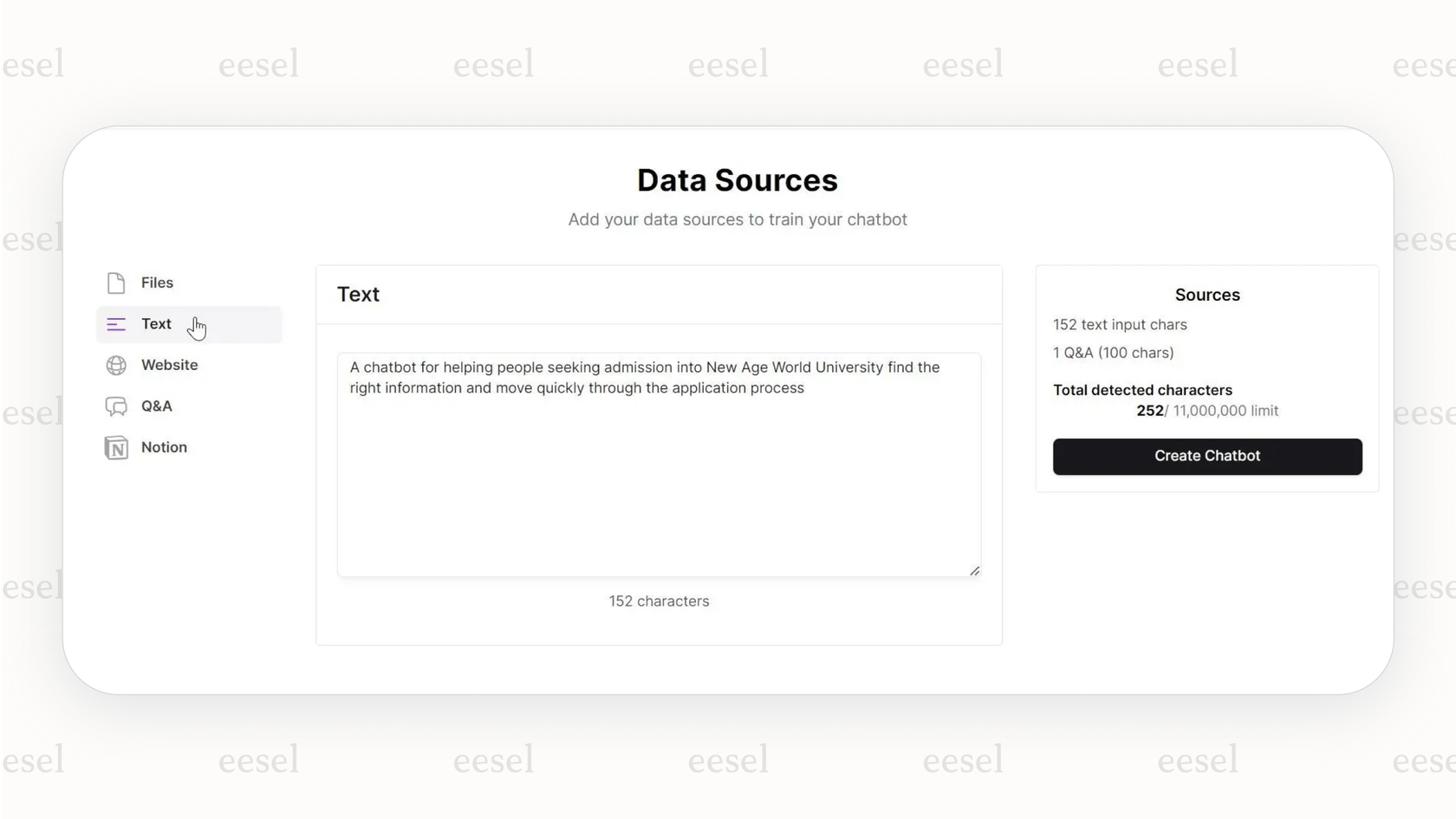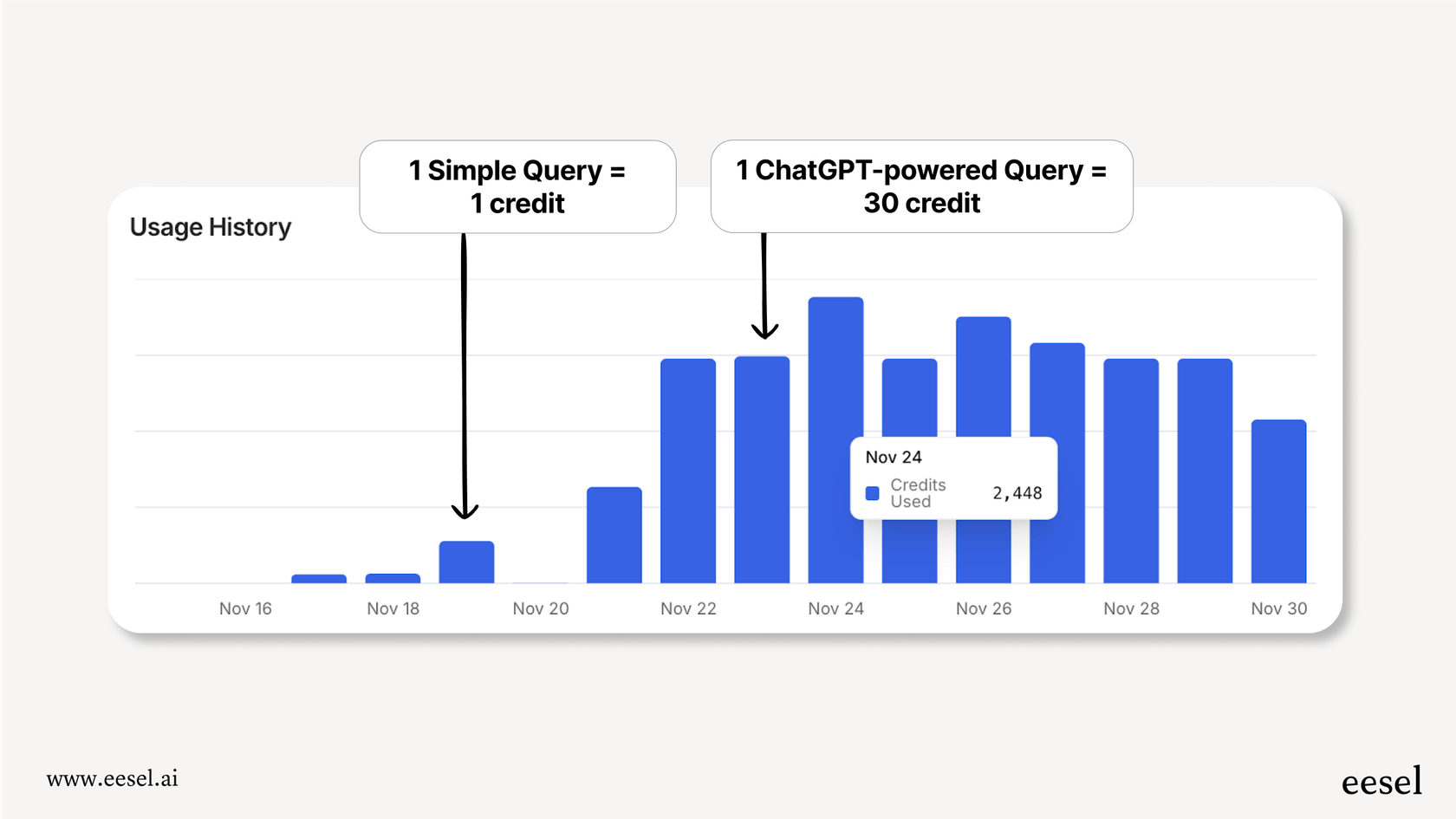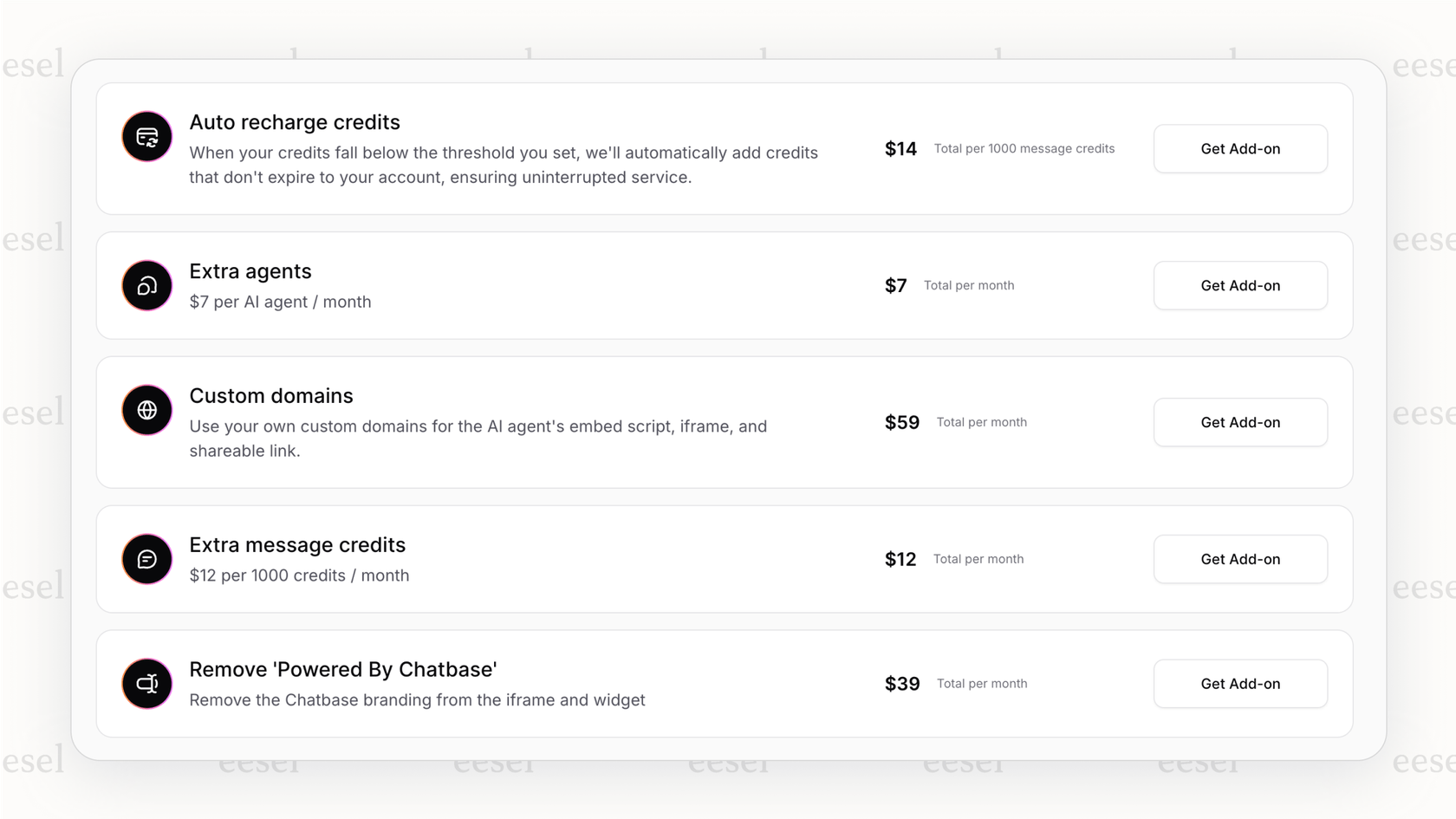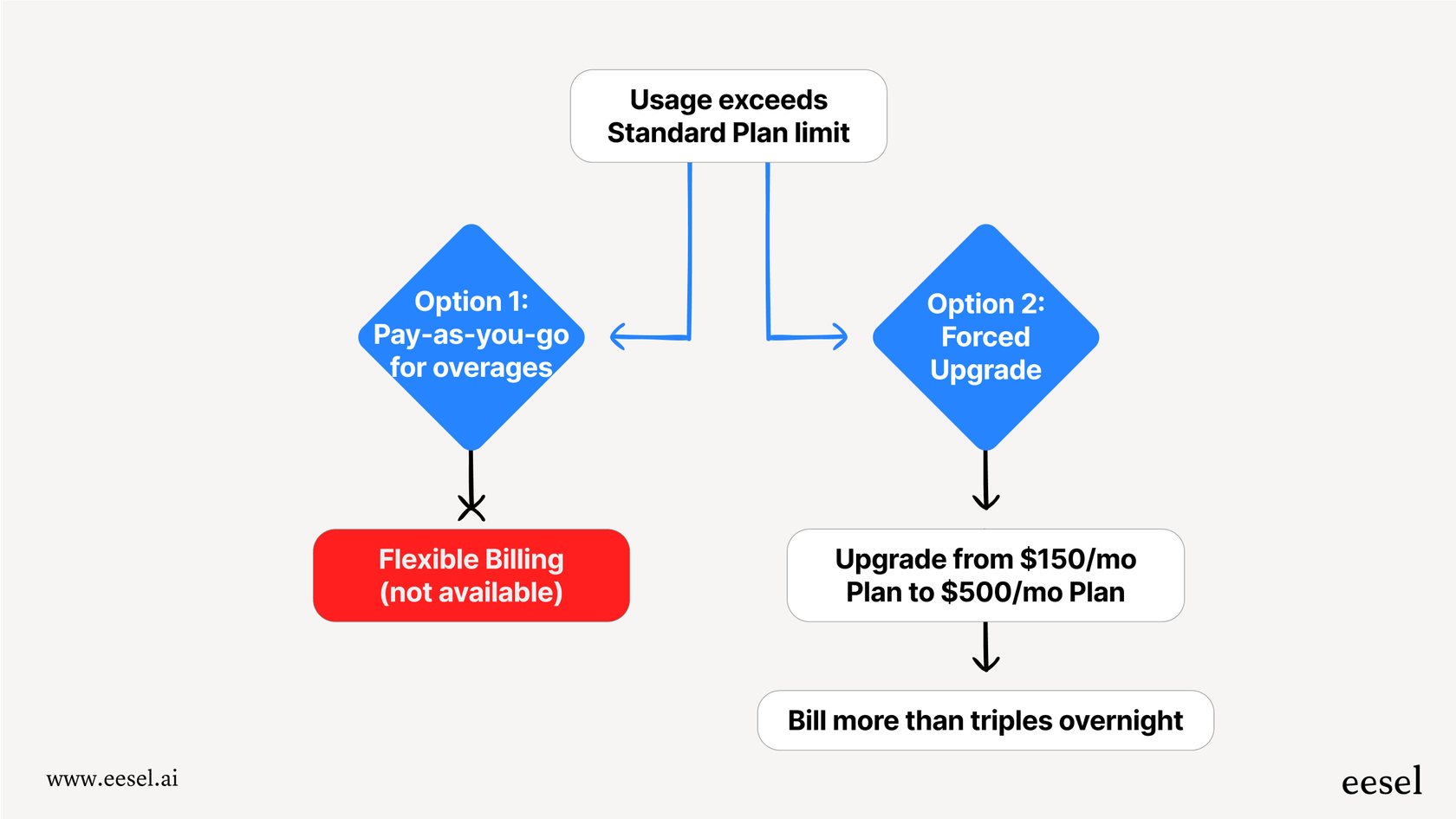
So, you're looking into Chatbase. It’s definitely one of the popular kids on the block for businesses testing the AI support waters. It has a reputation for being incredibly user-friendly, letting you spin up an AI chatbot from your own data in just a few minutes.
But here’s the thing: while getting started is a breeze, figuring out what you’ll actually pay and if it’s a good long-term move can be a headache. The pricing isn’t a simple monthly fee. It’s a jumble of different plans, a slightly baffling message credit system, and a bunch of paid add-ons that can make your bill creep up unexpectedly.
This guide is here to cut through the noise. We're going to give you a clear, honest breakdown of the Chatbase pricing model. We'll get into the details of each plan, shine a light on the hidden costs, and help you figure out if it's the right tool for your support team as you grow.
What is Chatbase?
At its heart, Chatbase is a no-code tool for building and launching AI chatbots. The basic idea is that you "train" an AI agent by feeding it information. You can upload files like PDFs, drop in links to your website, or just copy and paste text. The bot then uses that knowledge to answer questions.
Most people use it for things like frontline customer support, grabbing leads by asking for contact info, or just giving visitors on their website quick answers. The main appeal for a lot of folks is how simple it is. You don't need to write a line of code or have a technical background to get a basic chatbot live.

A full breakdown of the official Chatbase pricing
Chatbase has four main pricing tiers, plus a custom Enterprise plan for the big players. Each plan sets different limits on things like message credits, how many AI agents you can create, and the amount of data you can use for training. Getting a handle on these limits is the first step to understanding the real cost.
Here's how the plans compare:
| Plan | Monthly Price | Key Features & Limits | Best For |
|---|---|---|---|
| Free | $0 | 1 AI agent, 100 message credits/mo, 400KB data limit, 10 training links. | Individuals just playing around or for a tiny, personal project. |
| Hobby | $40 | 1 AI agent, 2,000 message credits/mo, 33MB data limit, unlimited links, API access. | Solo founders or small projects with pretty low chat volume. |
| Standard | $150 | 2 AI agents, 12,000 message credits/mo, 33MB data limit, 3 seats. | Small teams just starting to get serious about their support. |
| Pro | $500 | 3 AI agents, 40,000 message credits/mo, 33MB data limit, 5+ seats, advanced analytics. | Businesses with more traffic and a need to dig into the data. |
| Enterprise | Custom | Custom everything, priority support, a dedicated manager, and SLAs. | Large companies with complex security and support needs. |
Now, on top of those monthly fees, there are a handful of add-ons that can really inflate your bill. These are often for features you might assume come standard:
-
Auto-recharge credits: $14 for every extra 1,000 credits.
-
Extra AI agents: $7 per agent each month.
-
Custom domains: $59 a month.
-
Remove 'Powered By Chatbase' branding: $39 a month.
Beyond the sticker price: The real cost of Chatbase
The pricing page only gives you part of the picture. To really get what Chatbase will cost you, you have to dig into how the model actually works, especially when it comes to those message credits and sneaky add-ons.
How message credits work
This is probably the most confusing part of the Chatbase pricing structure. You see "message credits" and probably think one credit equals one answer from your bot. Nope. It's not that straightforward. The number of credits you burn through for each response depends on which AI model you're using.
For instance, Chatbase's own docs say that a powerful model like GPT-4 will cost you 20 credits for just one response. A simpler, less powerful model might only cost one credit.

This creates a huge headache: your costs are totally unpredictable. Let's say you're on the Standard plan with 12,000 credits. You might think that gets you 12,000 customer chats. But if you need to use a quality model to give accurate answers, you could burn through your entire allowance after only 600 responses. This makes budgeting a total guessing game and puts you in a tough spot: either cough up more money for credits or intentionally lower the quality of your customer support.
It's a common problem with pricing models that charge per interaction. In contrast, platforms like eesel AI offer straightforward plans based on overall capacity. With predictable pricing, you never get a nasty surprise on your bill after a busy month. You can scale up your support without constantly worrying about your costs spiraling out of control.
The hidden costs of add-ons
A lot of the features you'd consider essential to make a chatbot look professional are treated as paid extras by Chatbase. If you want the bot to feel like a true part of your brand, you're going to have to pay up.
Want to remove the "Powered by Chatbase" branding? That'll be $39 a month. Want to use your own domain? That's another $59 a month. All of a sudden, you're paying nearly $100 extra every month just for basic branding. And as you grow, you might need more AI agents, which tacks on another $7 for each one, every single month. It feels a bit like you're being penalized for succeeding.

Chatbase pricing tiers: Key features and limitations
What you get for your money is just as important as the price tag. While Chatbase has some neat features, many of them are locked away in expensive plans or come with some pretty tight restrictions.
Constraints on AI actions and integrations
Chatbase's "AI Actions" feature sounds great. It lets your chatbot connect to other tools, like Calendly to book meetings or Zendesk to create support tickets. The problem is, the limits on the cheaper plans make this feature a lot less useful in practice. The $40/month Hobby plan gives you a measly five AI Actions. That’s barely enough to do more than answer a few basic questions.
On top of that, Chatbase isn't really built for complex, multi-step tasks. If your support process has any kind of "if this, then that" logic or needs the AI to do a few things in a row, you're going to hit a ceiling pretty fast. For teams that need more precise control, an AI platform with a proper workflow engine is a much better bet. For example, eesel AI lets you set up detailed rules for automation, when to escalate to a human, and even make custom API calls, all without these kinds of frustrating limits.
Customization and control
Chatbase does a decent job of letting you tweak the AI’s personality. You can set its tone and give it some basic instructions, like telling it to act as a friendly support agent. It's a solid starting point.
But it's missing deeper operational control. You can't easily tell the AI to only handle certain types of questions while sending everything else to a human. It's more of an all-or-nothing situation, which can be pretty risky. You either trust it to handle everything it thinks it can, or you don't use it at all. This lack of selective automation is a real issue for teams that want to introduce AI thoughtfully.
This is where a tool like eesel AI really shines. It gives you full control. You can start small, telling it to only automate your simplest, most common tickets, like "where is my order?" inquiries. Everything else gets escalated to a human agent, guaranteed. This lets you build trust in the system and slowly expand its responsibilities when you're ready.
Is the Chatbase pricing model built for scaling teams?
When your business is growing, you need your tools to grow with you. Unfortunately, the Chatbase pricing model throws up some serious roadblocks for scaling teams.
The huge jump between plans
One of the biggest warning signs is the price leap between tiers. Going from the Standard plan at $150/month to the Pro plan at $500/month is a 233% increase. Imagine your team just barely outgrows the 12,000-credit limit on the Standard plan. Your only option is a massive price hike for the next level up.
This makes it incredibly tough to scale smoothly. A successful marketing push or a busy holiday season could unexpectedly shove you into a much more expensive plan, completely blowing up your budget.

The lack of risk-free testing
While Chatbase does offer some analytics, the truly helpful insights are saved for the pricey Pro plan. But more importantly, there’s no safe way to test your chatbot before you unleash it on your customers. You build it, you put it live, and you cross your fingers. For any established business, that's a huge gamble. A bot that gives bad answers can do more harm than good, chipping away at customer trust and damaging your reputation.
This is a major difference with more advanced platforms. eesel AI, for example, has a powerful simulation mode. It lets you test your AI on thousands of your actual past support tickets. You can see exactly how it would have answered, get solid forecasts on how many tickets it can resolve, and find gaps in its knowledge, all before a single customer ever interacts with it. This means you can go live with confidence, knowing exactly what to expect.
The bottom line: When is Chatbase pricing worth it?
Look, Chatbase is a great tool for a certain type of user. It’s perfect for solo entrepreneurs, very early-stage startups, or businesses with simple, low-volume support needs who just want to get a basic chatbot up and running fast. Its simplicity is its biggest strength.
However, if your business is growing and you need predictable costs, deeper customization, real operational control, and a safe way to deploy AI, the limits of the Chatbase pricing model and its features will likely become a bottleneck. The unpredictable credit system, pricey add-ons, and huge jumps between plans don't make it a great long-term partner for growth.
A better alternative for powerful, predictable AI support
For teams that are ready to move beyond basic chatbots and want a more strategic, scalable solution, eesel AI is the natural next step. It was built from the start to solve the exact problems that growing support teams run into.
Here’s a quick look at the main differences:
-
Transparent & predictable pricing with no per-answer fees or confusing credit math. You always know what your bill will be.
-
Go live in minutes on a platform that's truly self-serve. You can connect your helpdesk with a single click and get going without ever talking to a salesperson.
-
Total control over your AI workflows. You decide precisely which tickets get automated and which go to your team, putting you in the driver's seat.
-
Risk-free rollout with a powerful simulation mode. Test your setup on your own historical data and deploy knowing you'll get the results you're looking for.
eesel AI isn't just another chatbot builder; it's a strategic platform designed to help you build smarter, more effective, and scalable customer support.
This review offers a detailed walkthrough of Chatbase's features and a breakdown of its pricing tiers.
Frequently asked questions
Chatbase pricing can be unpredictable due to its message credit system, where more powerful AI models consume significantly more credits per response. If you exceed your plan's allowance, auto-recharge adds $14 for every 1,000 extra credits, leading to variable monthly bills.
In Chatbase pricing, one message credit does not always equal one bot response. More advanced AI models, like GPT-4, can consume up to 20 credits for a single answer, while simpler models use fewer. This means your allocated credits might last for far fewer actual customer interactions than expected.
Beyond the monthly plan, Chatbase pricing includes several common add-ons. Essential features like removing "Powered by Chatbase" branding costs $39/month, and using a custom domain costs $59/month. Additionally, extra AI agents are $7/month each, and auto-recharge for message credits adds $14 per 1,000 credits.
The Chatbase pricing model presents challenges for scaling teams due to significant price jumps between tiers, like the 233% increase from Standard to Pro. The unpredictable message credit usage and additional costs for necessary features can make budgeting difficult as your volume grows.
Enterprise Chatbase pricing is custom-quoted and designed for large organizations with specific, complex needs. It offers tailored features, custom limits, priority support, a dedicated account manager, and Service Level Agreements (SLAs) for reliability and security.
The data limits for training AI agents do vary across Chatbase pricing plans. While the Free plan is very restrictive at 400KB, the Hobby, Standard, and Pro plans all cap out at 33MB, which can be a limitation for businesses needing to train on extensive knowledge bases.
Share this post

Article by
Kenneth Pangan
Writer and marketer for over ten years, Kenneth Pangan splits his time between history, politics, and art with plenty of interruptions from his dogs demanding attention.







